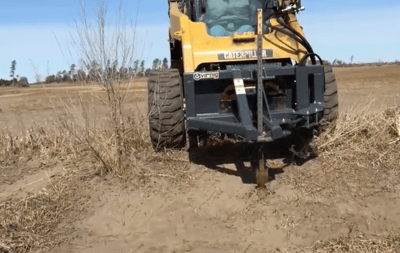Yes, you can. A skid steer tree puller attachment can be used for more than trees. While it’s not the most versatile attachment on the market, there are a couple of applications where a tree puller can save you a lot of time and effort. But as something specifically designed for pulling trees, this attachment does provide some noteworthy efficiencies, which I’ll also cover.
What Else Can a Skid Steer Tree Puller Do?
 A tree puller is great at removing more types of vegetation than just trees. It can also remove bushes, weeds, saplings, and stumps. Besides plant life, tree pullers make quick work out of pulling out fence posts. If you’ve ever tried to remove a well-placed fence post (or 50), you know how big of a job it can be.
A tree puller is great at removing more types of vegetation than just trees. It can also remove bushes, weeds, saplings, and stumps. Besides plant life, tree pullers make quick work out of pulling out fence posts. If you’ve ever tried to remove a well-placed fence post (or 50), you know how big of a job it can be.
Tree Puller Efficiencies
Here’s how smoothly things go with a tree puller: You drive up to the object you want to remove, clamp it, and pull it up. Fence posts will come out unharmed. When you’re pulling trees or other vegetation, they’ll usually come out with the roots intact.
Removing the root system – By pulling out the root system, you’re drastically reducing the chance of regrowth. If the roots are left behind, there's a high risk of regrowth. Plus, having the roots out of the way means you won’t run into them when plowing or raking the area.
Operating alone - The tree puller allows an operator to quickly remove objects all on your own. The alternative, using chains to pull out 100s of objects is tedious, inefficient, and often requires an extra person to help.
Selectively pulling vegetation – A skid steer tree puller allows you to pick and choose which plants you pull. For instance, if your bushes are too close together, a tree puller can get in there and remove just the plants you want to be removed and leave the others without damage.
Details to Consider
Before investing in a skid steer tree puller, look for the following details:
- Operating capacity - The operating capacity of your skid loader is the most important limiting factor. The higher a machine's operating capacity, the heavier the objects that can be pulled. Small trees (1-3" in diameter) are usually a non-issue and are easily pulled out at the base. Larger trees (4"or more in diameter) will require more power and may be a challenge depending on other factors below.
- Ground condition and climate – Vegetation in drier climates will have deeper roots, and harder ground conditions (like clay) will make pulling more difficult.
- Vegetation type – Certain trees and plants have deeper root systems, and others have more shallow roots. Understanding the vegetation you’ll be working with can help ensure you get a tree puller that’s up to the task.
- Guarded cylinder – Protecting your cylinder from falling debris will prevent damage and extend cylinder life.
- Jaw opening – A tree puller can only grab on to objects it can fit its jaws around.
- Jaw spacing – A hard stop at the tip of the jaws to maintain a small space between will allow you to pull small trees out without shearing them.
All of these combined should help you find the best tree puller for your application.

